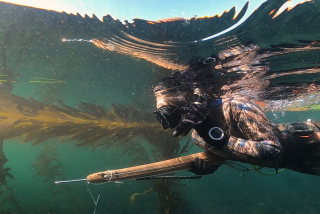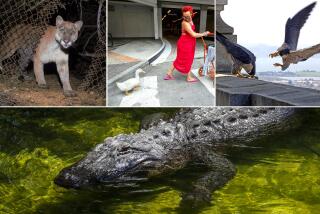Paquita Machris, 95; L.A. philanthropist and big-game hunter
- Share via
Paquita Machris, a big-game hunter who went on numerous safaris around the globe with her husband, Maurice, and with him contributed thousands of bird, insect and mammal specimens to the Natural History Museum of Los Angeles County, has died. She was 95.
Machris died Oct. 7 of age-related causes at UCLA Medical Center, said her son, Robert.
A second-generation Angeleno, Machris was taught to shoot a pistol as a young girl by her father, the owner of Lick Pier in Venice.
She and her husband, a Wilshire Oil Co. executive, went on their first safari -- to Africa -- in 1953.
“In those days, back in the ‘50s, not many women hunted big game,” said Robert Machris. But for his mother, he said, “it was just another facet of her life.”
By 1966, the mother of three children was described by a Times writer as “a ‘pistol-packing mama’ with literally tons of trophies to prove it.”
That included one of her largest -- a female elephant weighing about four tons, which became part of the African elephant habitat group that opened that year at the Natural History Museum and was said to be the only such exhibit in the world.
The diorama, which continues to be one of the museum’s most-viewed exhibits, features five elephants -- a bull, a half-grown bull, two cows and a baby -- in their natural habitat.
The habitat includes birds, giraffes and other mammals, as well as native acacia trees and other samples of the natural vegetation.
Machris saw no disparity between her big-game hunting and her considerable efforts at conservation, telling The Times in 1966 that “the hunter is actually the most concerned about conservation and laws to govern the increase of animals.”
Of her conservation efforts, Jane Pisano, the museum’s director, noted that Machris’ safari club “was instrumental in relocating and preserving a herd of Arabian oryx when only 35 existed in the world.”
“What they did was, they helped organize Operation Oryx,” Pisano said.
“This operation bred these oryxes in captivity and reintroduced the species into the wild in Israel and Jordan.”
Pisano added, “I don’t know of anyone who sponsored more research expeditions on behalf of the museum than Paquita and her husband, Maurice. There were expeditions to South America, Central America, India, the Galapagos Islands and East Africa.”
One expedition Machris and her husband sponsored was to Greenland, which led to the acquisition of the museum’s narwhal specimen -- an Arctic whale with a single, 6-foot tooth.
“She was really an amazing philanthropist, and she just wanted to give things that the people of Los Angeles would enjoy,” Pisano said.
By 1966, Machris and her husband had traveled to more than 90 countries.
“I love everything about hunting. . . traveling through the forests. . . meeting the people,” Machris told The Times in 1966. “It’s amazing how well people can communicate without speaking the same language. We learn so much more about each other -- much more than as just a tourist -- because we are working together on the same problem.”
Machris “was this very tiny woman who just lived life on this incredibly large scale,” said Pisano, adding that “she was a great storyteller, and she told these tales of what was really a bygone era. Almost no one lives a life like that -- ever, and she did.”
She was born Frances Virginia Lick on Jan. 22, 1912, and nicknamed Paquita as a child by her grandmother.
Ina Hillebrandt, who interviewed Machris for a book she is writing, said Machris grew up among her father’s friends, who included comedy-studio owner Hal Roach, with whom she hunted locally.
“I’ve been told that other females would see her as a role model,” Hillebrandt said. “She was outspoken, a woman who enjoyed life to the fullest and was a philanthropist -- she was not just self-interested at all.”
Machris, she said, also “was a risk-taker, she was very courageous, and she never hesitated to do any of these things.”
Although Machris was sometimes in danger on her trips, she took peril in stride.
When an ox came up to her on a hill in India, Hillebrandt said, Machris stood calmly as the ox began sniffing her.
“She decided, OK, and talked to him, ‘What are you doing?. . . ‘ That was her style. She didn’t run away from danger or adventure.”
That included standing her ground to shoot a charging rhino on one safari.
Although Machris enjoyed big-game hunting, Hillebrandt said, “she really was much more a conservationist as time went on. In fact, even while they were doing the safaris, that’s what they were promoting.”
Robert Machris said his mother continued to hunt small game into her 80s.
In addition to her father owning Lick Pier, Machris had other family ties to Los Angeles history.
Her maternal grandfather owned the Los Angeles Brewing Co., and her mother was instrumental in the development of the Hollywood Bowl.
Her great-grand-uncle, James Lick, built and endowed the Lick Observatory at Mt. Hamilton in Santa Cruz, which Machris continued to support over the years. Machris, who was a founding member of the Los Angeles Music Center, also supported numerous charities and causes, including Wildlife Preservation Trust International, the Zoological Society of San Diego and the Los Angeles Philharmonic Assn.
In addition to her son Robert, she is survived by her son Terry; her daughter, Marla Hooker; three grandchildren; and three great-grandchildren.
Instead of flowers, the family asks that donations be made to ARCS Foundation Inc., 24520 Hawthorne Blvd., Torrance, CA, 90505-6505, or the Roar Foundation, 6867 Soledad Canyon Road, Acton, CA 93510.
--
More to Read
Sign up for Essential California
The most important California stories and recommendations in your inbox every morning.
You may occasionally receive promotional content from the Los Angeles Times.













